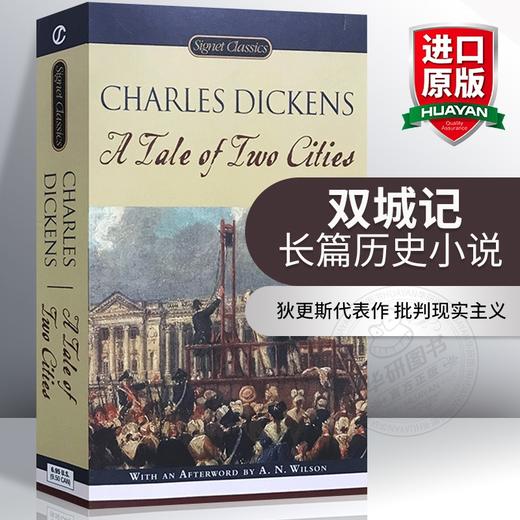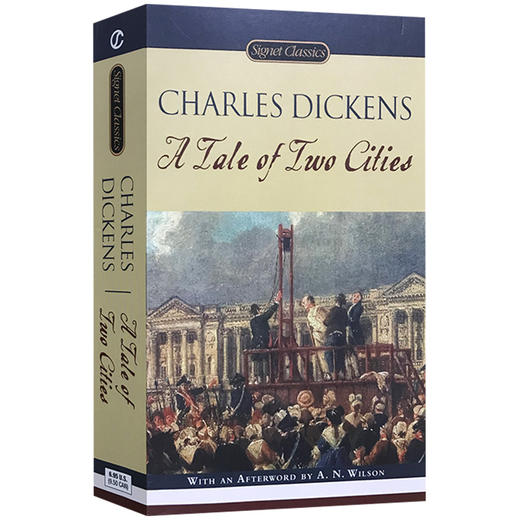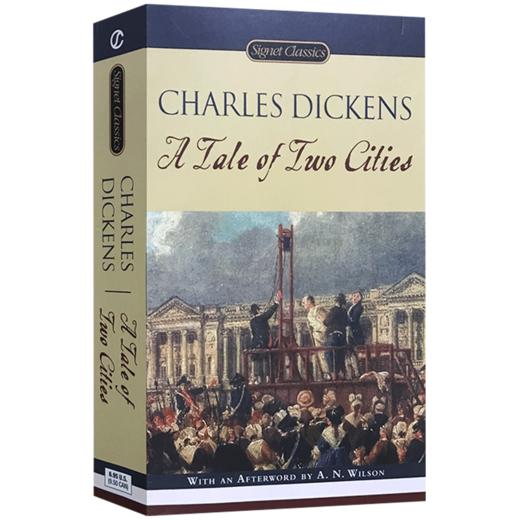双城记 英文原版书 A Tale of Two Cities 长篇历史小说 查尔斯狄更斯 雾都孤儿作者原著 全英文版原版 正版进口英语书籍【经典文学读物】
| 运费: | ¥ 0.00-999.00 |
| 库存: | 169 件 |
商品详情
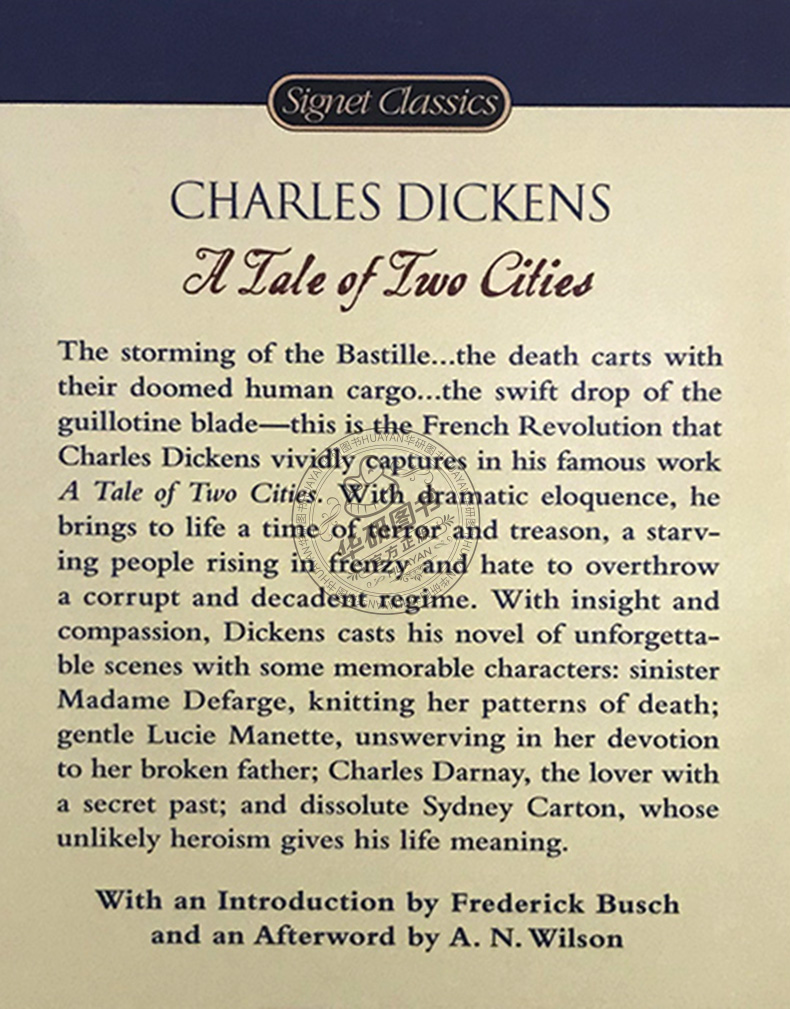
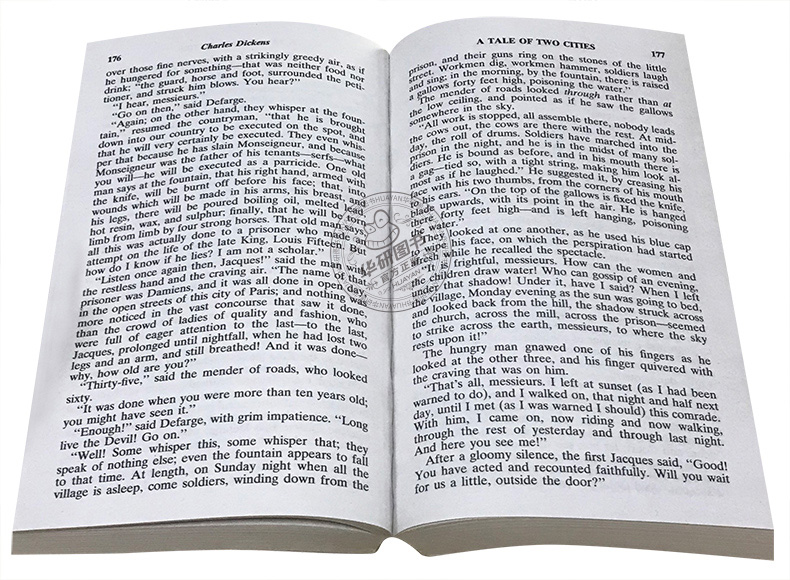
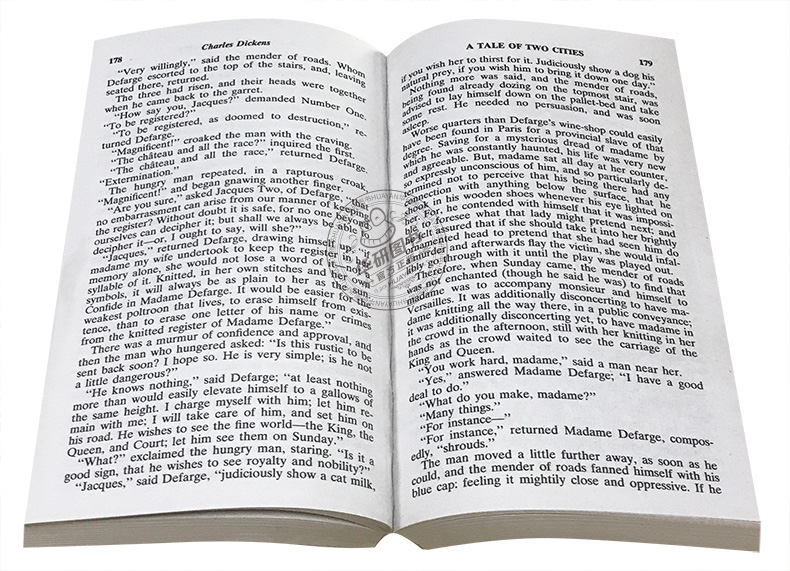
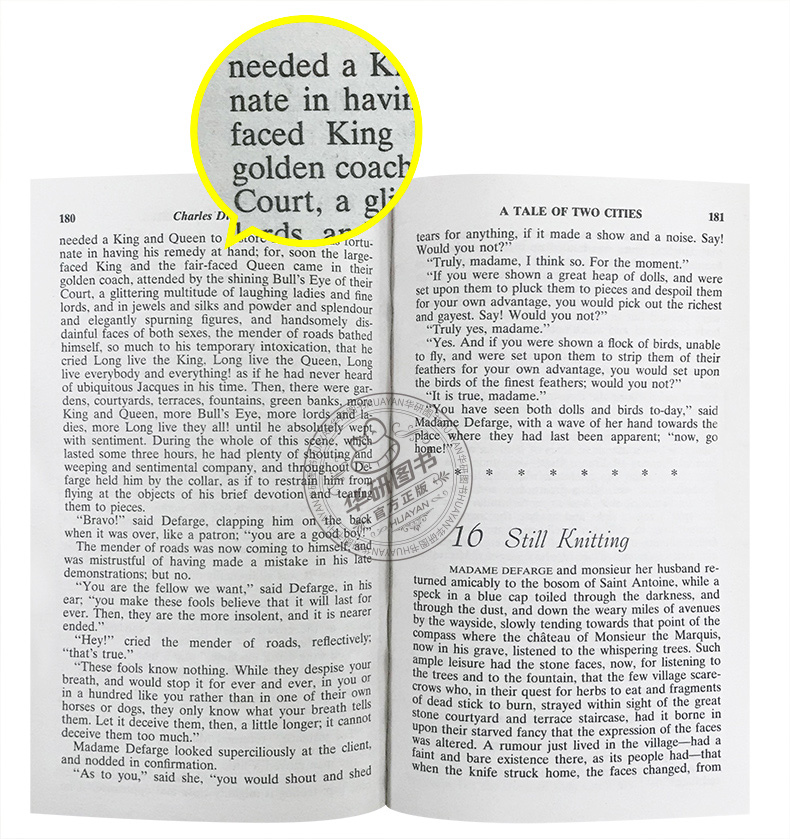

书名:A Tale of Two Cities 双城记
难度:Lexile蓝思阅读指数790
作者:Charles Dickens查尔斯·狄更斯
出版社名称:Signet Classics
出版时间:2007
语种:英文
ISBN:9780451530578
商品尺寸:10.6 x 2 x 17.1 cm
包装:简装
页数:398
A Tale of Two Cities《双城记》是英国大文豪查尔斯·狄更斯所著的一部以法国大革命为背景的长篇历史小说,故事中将巴黎、伦敦两个大城市连结起来,围绕着曼马内特医生一家和以德法日夫妇为首的圣安东尼区展开故事。本书适合有一定英文水平英国文学爱好者阅读。
推荐理由:
1.A Tale of Two Cities《双城记》是世界上伟大的批判现实主义杰作之一,不可不看;
2.与一般的历史小说不同,本书的人物与情节都是虚构的,但是小说结构完整严密,情节感人肺腑,寓意深刻;
3.英文原版无删节,采用轻型环保纸印刷,书本小巧轻盈,方便携带。
The storming of the Bastille... the death carts with their doomed human cargo... the swift drop of the guillotine blade-this is the French Revolution that Charles Dickens vividly captures in his famous work A Tale of Two Cities.With dramatic eloquence, he brings to life a time of terror and treason, a starving people rising in frenzy and hate to overthrow a corrupt and decadent regimes.With insight and compassion,Dickens casts his novel of unforgettable scenes with some memorable characters: sinister Madame Defarge, knitting her patterns of death; gentle Lucie Manette, unswerving in her devotion to her broken father;Charles Darnay, the lover with a secret past; and dissolute Sydney Carton, whose unlikely heroism gives his life meaning.
A Tale of Two Cities《双城记》是一部以法国大革命为背景所写成的长篇历史小说,再现了那时的巴黎和伦敦以及整个法兰西和英格兰的历史面貌。故事围绕着曼马内特医生一家和以德法日夫妇为首的圣安东尼区展开故事。小说里描写了贵族如何败坏、如何残害百姓,人民心中积压对贵族的刻骨仇恨,导致了不可避免的法国大革命。
With dramatic eloquence, this story of the French Revolution brings to life a time of terror and treason, and a starving people rising in frenzy and hate to overthrow a corrupt and decadent regime.
查尔斯·狄更斯(Charles Dickens,1812~1870),1812年生于英国的朴次茅斯。15岁时,狄更斯在一家律师事务所当抄写员并学习速记,此后,又在报社任新闻记者。在《记事晨报》任记者时,狄更斯开始发表一些具有讽刺和幽默内容的短剧,主要反映伦敦的生活,逐渐有了名气。他了解城市底层人民的生活和风土人情,这些都体现在他热情洋溢的笔端。此后,他在不同的杂志社任编辑、主编和发行人,其间发表了几十部长篇和短篇小说,主要作品有The Pickwick Papers《匹克威克外传》、Oliver Twist《雾都孤儿》、The Old Curiosity Shop《老古玩店》、Hard Times《艰难时世》、Our Mutual Friend《我们共同的朋友》、A Tale of Two Cities《双城记》等。
As a child,Charles Dickens(1812-70) came to know not only hunger and privation, but also the horror of the infamous debtors' prison and the evils of child labor. A surprise legacy brought release from the nightmare of prison and "slave" factories and afforded Dickens the opportunity of two years' formal schooling. He taught himself shorthand and worked as a parliamentary reporter until his writing career took off with the publication ofSketches by Boz(1836) andThe Pickwick Papers(1837). As a novelist and magazine editor, Dickens had a long run of serialized success throughOur Mutual Friend(1864-65). In later years, ill health slowed him down, but he continued his popular dramatic readings from his fiction to an adoring public, which included Queen Victoria. At his death,The Mystery of Edwin Droodremained unfinished.
Distinguished writer, teacher, and criticFrederick Buschwas the author of more than twenty works of fiction, includingNorth,Girls, andThe Mutual Friend, a novel about Charles Dickens.
A. N. Wilsonwas born in 1950 and educated at Rugby and New College, Oxford. A Fellow of the Royal Society of Literature, he has held a prominent position in the world of literature and journalism. Among his acclaimed biographies areLivesof Sir Walter Scott (John Llewellyn Rhys Prize), Tolstoy (Whitbread Award for Biography), C.S. Lewis, Hilaire Belloc, and Iris Murdoch.The Victorians, his study of the Victorian Age, and its sequel,After the Victorians, were both published to widest critical acclaim, and he is the award-winning author of such novels asMy Name Is LegionandThe Healing Art.
The Period
It was the best of times, it was the worst of times, it was the age of wisdom, it was the age of foolishness, it was the epoch of belief, it was the epoch of incredulity, it was the season of Light, it was the season of Darkness, it was the spring of hope, it was the winter of despair, we had everything before us, we had nothing before us, we were all going direct to Heaven, we were all going direct the other way--in short, the period was so far like the present period, that some of its noisiest authorities insisted on its being received, for good or for evil, in the superlative degree of comparison only.
There were a king with a large jaw, and a queen with a plain face, on the throne of England; there were a king with a large jaw, and a queen with a fair face, on the throne of France. In both countries it was clearer than crystal to the lords of the State preserves of loaves and fishes, that things in general were settled for ever.
It was the year of Our Lord one thousand seven hundred and seventy-five. Spiritual revelations were conceded to England at that favoured period, as at this. Mrs. Southcott had recently attained her five-and-twentieth blessed birthday, of whom a prophetic private in the Life Guards had heralded the sublime appearance by announcing that arrangements were made for the swallowing up of London and Westminster. Even the Cock-lane ghost had been laid only a round dozen of years, after rapping out its messages, as the spirits of this very year last past (supernaturally deficient in originality) rapped out theirs. Mere messages in the earthly order of events had lately come to the English Crown and People, from a congress of British subjects in America: which, strange to relate, have proved more important to the human race than any communications yet received through any of the chickens of the Cock-lane brood.
France, less favoured on the whole as to matters spiritual than her sister of the shield and trident, rolled with exceeding smoothness down hill, making paper money and spending it. Under the guidance of her Christian pastors, she entertained herself, besides, with such humane achievements as sentencing a youth to have his hands cut off, his tongue torn out with pincers, and his body burned alive, because he had not kneeled down in the rain to do honour to a dirty procession of monks which passed within his view, at a distance of some fifty or sixty yards. It is likely enough that, rooted in the woods of France and Norway, there were growing trees, when that suffer was put to death, already marked by the Woodman, Fate, to come down and be sawn into boards, to make a certain movable framework with a sack and a knife in it, terrible in history. It is likely enough that in the rough outhouses of some tillers of the heavy lands adjacent to Paris, there were sheltered from the weather that very day, rude carts, bespattered with rustic mire, snuffed about by pigs, and roosted in by poultry, which the Farmer, Death, had already set apart to be his tumbrils of the Revolution. But that Woodman and that Farmer, though they work unceasingly, work silently, and no one heard them as they went about with muffled tread: the rather, forasmuch as to entertain any suspicion that they were awake, was to be atheistical and traitorous.

- 报佳音
- 主内书籍文创礼品
- 扫描二维码,访问我们的微信店铺
